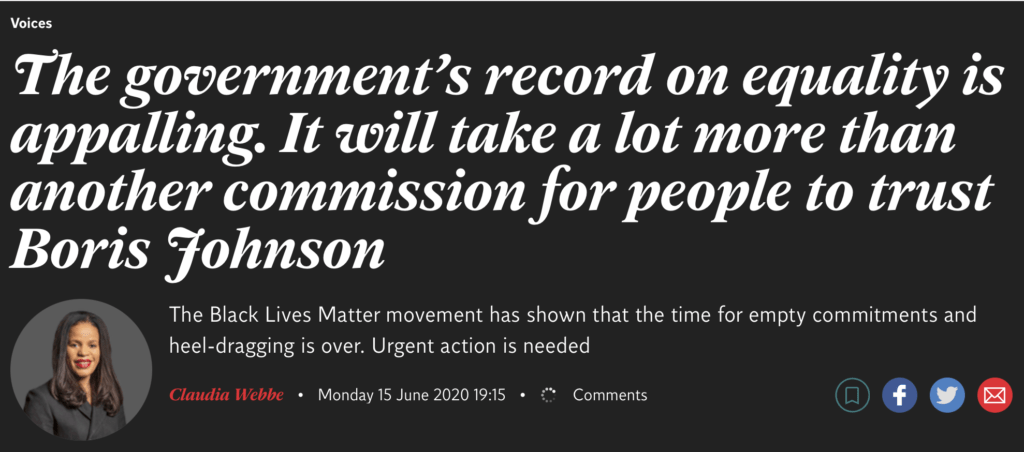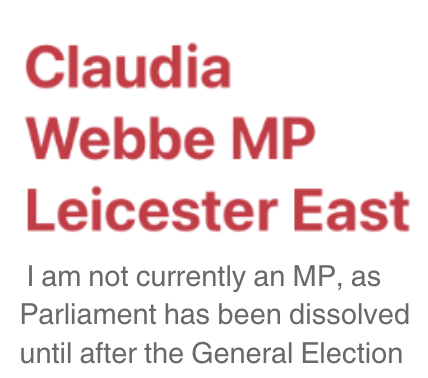
The government’s record on equality is appalling. It will take a lot more than another commission for people to trust Boris Johnson
By Claudia Webbe MP
The Black Lives Matter movement has shown that the time for empty commitments and heel-dragging is over. Urgent action is needed says Claudia Webbe MP
Buried deep within a divisive, behind-a-paywall opinion piece, Boris Johnson has announced a new “cross-governmental commission to look at all aspects of inequality”.
I am concerned that the prime minister’s vague announcement is simply a deflection aimed to placate weeks of protests and scrutiny of his government’s appalling record on equality. After all, last week it was reported that the Home Office is being investigated by the Equality and Human Rights Commission over its callous “hostile environment” immigration measures, that caused unlawful suffering for thousands of the Windrush generation.
I am also wary that, by conflating racial discrimination with other kinds of “inequality”, the government is attempting to water down any findings that tackle racial inequality. Johnson did not help impressions that he is not taking this issue seriously by stating his ambition to end “the sense of victimisation” among Black communities. This is an outrageous, belittling way to talk about the very real systemic and structural racism that exists throughout our society.
It is abundantly clear that immediate action is needed, not another long-winded fact-finding mission. As the inspiring Black Lives Matter movement has demonstrated, we already know that severe racial disparities exist across all aspects of British life. Since 2015 alone, there have been more than 200 recommendations made in independent inquiries commissioned by government into racial inequality, with very few being implemented.
Tragically, the examples of institutional racism in the UK are endless.
For instance, it has been extremely concerning to see the disproportionate impact of the coronavirus upon African, Asian and minority ethnic communities. This was proven by the government’s own report – which they shamefully only published after repeated pressure – and which does not outline any action or protective measures.
Uneven health figures reflect severe racial disparities in our economy. The Resolution Foundation think tank estimate that African, Caribbean, Indian, Pakistani and Bangladeshi employees experience an annual pay penalty of £3.2bn.
In our criminal justice system, black people disproportionately suffer from the use of force by police in the UK, are more likely to be charged and are over-represented in the prison population.
The scourge of child hunger also has an uneven impact. As the inspiring Marcus Rashford highlighted, 45 per cent of children in African, Asian and minority ethnic groups are now in poverty. Yet the government has refused to change its cruel decision to cancel free school meals over the summer holiday.
Rather than stoking the flames of a racially charged, straw-man culture war around removing the statue of Winston Churchill – something that has not been proposed by the Black Lives Matter movement – the prime minister must act to end the severe racial inequalities that exist in the UK.
Given Johnson’s long history of comments – including describing African people as having “watermelon smiles” and that women in burqas looked like “bank robbers” – there remain legitimate concerns regarding his personal commitment to tackling racial inequalities.
To assuage these, he could begin by apologising for his use of such racist and insensitive language – something he has yet to do.
There is a litany of urgent actions that the prime minister could take to show that he is taking this issue seriously. He could implement the recommendations from the existing reviews. He could reform the UK’s racist criminal justice system. He could deliver justice for the victims of racial discrimination, including Grenfell Tower and the Windrush generation.
He could ensure that, when a black person dies in police custody – as they disproportionately do – the incident is thoroughly investigated, and the police involved face justice. He could transform our education system to teach the reality of colonialism, imperialism and the transatlantic slave trade. He could address the severe racial pay gap. He could end racist policies like no recourse to public funds and the hostile environment.
The Black Lives Matter movement has shown that the time for empty commitments and heel-dragging is over. Now is the time for our leaders, in the UK and across the world, to meaningfully and immediately address the scourge of institutional racism.
Claudia Webbe MP is the member of Parliament for Leicester East. You can follow her at www.facebook.com/claudiaforLE and twitter.com/ClaudiaWebbe


